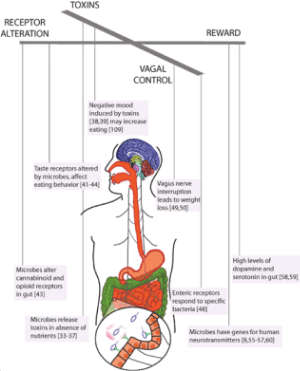Microbial genes out number human genes by 100 to 1 in the intestinal microbiome. In a recent study published in the Journal Prospect and Overviews, the authors hypothesize that the diversity of the gut bacteria effect the health of the host. The authors also propose that poor food choices may be encouraged by gut bacteria, such that the bacteria’s interest override our good intentions to eat less sugar for example.
Did you know?
That different types of gut bacteria like different types of fuel.
Examples:
- Bacteroidetes has a preference for certain fats.
- Bifidobacteria fare better on fiber.
- African children raised on sorghum and unique microbes that digest cellulose.
- Special microbes that digest seaweed have been isolated in humans in Japan.
Microbes can manipulate host behavior.

Examples:
- Those who crave chocolate have different microbial metabolites in their urine than non cravers.
- A double blinded, randomized, placebo controlled trial found that drinking probiotic lactobacillus significantly altered mood.
- Colonization of the gut with a pathogen ampylobacter jejuni increased anxiety like behavior in mice.
- Recent studies have linked inconsolable crying of infancy colic with changes in gut bacteria, including reduced overall diversity, increased density of proteobacteria and decreased number of Bacteroidetes compared to controls.
- The gut bacteria of obese humans are less diverse than the microbiota of their lean twins, consistent with the hypothesis that lower diversity may affect eating behavior and satiety.
- Some Lactobacillus probiotics have been reported to reduce fat mass and improve insulin sensitivity and glucose tolerance, although these effects are not universally reported for all Lactobacillus species
- A randomized, placebo-controlled trial found that probiotic treatment in pregnancy, using L. rhamnosus GG and Bifidobacterium lactis along with dietary counseling, reduced abdominal fat at 6 months postpartum.
This review proposes that eating behavior in humans is influenced by the bacteria living in the gut.
To Sum It Up: Improving gut bacterial health and diversity may make changes in eating behavior and weight-loss come more easily.
DOI: 10.1002/bies.201400071




